E21 Why PR and communication are vital to attractions and what you should be focusing on. With William Kallaway
Will Kallaway, MD of PR and sponsorship consultancy Kallaway.
Kallaway is a communications consultancy that develops innovative growth campaigns for attractions, destinations, business and the arts.
Will has launched or grown some of the best known attractions in the UK ranging from The View from The Shard, Tower Bridge and The Mary Rose Museum to Hard Rock Cafe and Battersea Power Station.
What will you learn from this podcast?
- Why PR and communication is so important to attractions
- The importance of purpose
- Emerging consumer behavioural needs that attractions need to know
- Framing your campaign
- Measuring what matters
- Wrestler entrance theme songs
Key takeaways from Will on the podcast:
On Personal Relations:
PR is far more nuanced than promotional stuff- from a very strategic communications perspective, and thinking about all aspects of what the brand’s doing, behaving, training its people, and how to invest in the local community.
Put all that together into a coherent plan that enables the brand to reassure its customers, engage new customers, and reignite interest and engagement about what it is doing now, which hopefully builds footfall into the future.
“For those that can, (attractions) should continue to communicate and add value in a way that helps set their brand apart.”
“Reevaluate your audiences about what their interests are, and then engage and connect to those audiences in new and meaningful ways.”
“Authenticity and the quality of what you do, rather than just the price – the quality of what you do, the richness of experience, is going to be so much more powerful and relevant now”
Listen to the podcast here
E22 The transformation of Painshill Park, with Paul Griffiths, Director of Painshill.
Paul Griffiths, Director of Painshill Park Trust Ltd, a beautifully restored 18th Century landscape designed by Hon Charles Hamilton.
Paul has had an illustrious career in the attraction sector, having been Head of Operations for the Mary Rose Museum, Head of Visitor Operations for the London Historic Properties at English Heritage, and a guest lecturer at Southampton Solent University in Contemporary Tourism.
In July 2018 was awarded an Honorary Doctorate in Business for services to Tourism, Heritage and Conservation.
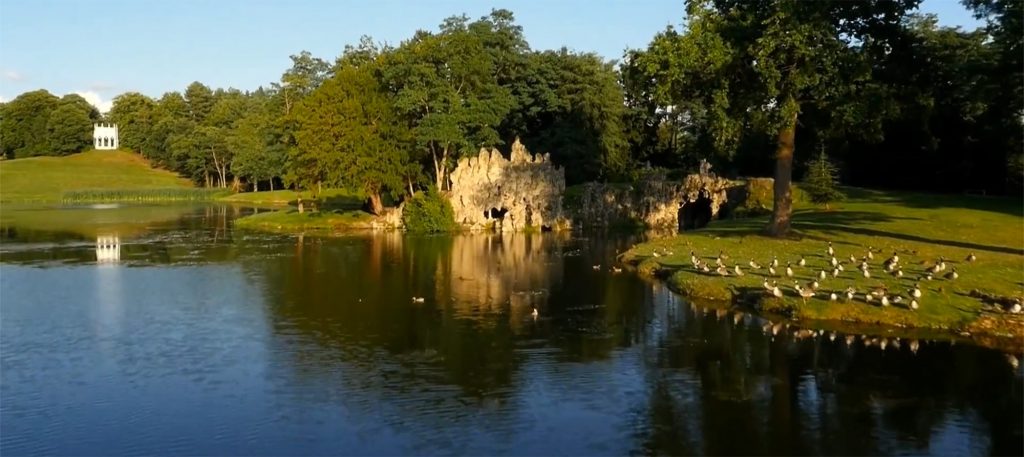
What will you learn from this podcast?
- The transformation of Painshill
- The emotional reopening
- Team motivation
- If pre-booking is here to stay
- Some seriously dodgy fashion choices from both of us!
Key takeaways from Paul on the podcast:
On motivation:
Getting everyone together and sharing things. They know what you’re trying to achieve, and buy into it, and you get people on board very early on.
“In terms of motivation, I think people have motivated themselves. There was a desire to make sure we got through this. And since reopening, there has been this outpouring of people, and love which I think has driven the team on.”
On pre-booking:
“Pre-booking. It worked, and I’d love to keep it. It’s been great, and it’s been particularly great during these times because we’re managing numbers.”
“We work in an industry, which is making great memories for people and giving people great days out. You want people to leave saying, “What an amazing place.”
Listen to the podcast here
E23 Experience gifting and multiple strategies to secure revenue for Christmas, with Simon Jones, MD of Digital Visitor
Simon Jones, Managing Director of Digital Visitor – the UK’s leading strategic digital marketing agency for travel, tourism and hospitality.
With nearly three decades worth of visitor attraction experience, Simon Jones has a unique background and understanding of the issues faced by visitor attractions.
Before co-founding Digital Visitor 15 years ago, Simon managed science centres and large-scale attractions including household names such as Sea Life, IMAX Cinemas and At-Bristol (now We the Curious). Knowing what it is like working brand-side has given Simon a unique perspective of a client’s challenges, as it is likely he faced the same challenge himself.
Nowadays, Simon works as Managing Director for Digital Visitor and uses his brand experience to help deliver digital projects that drive clear, measurable results for tourism businesses across the whole of the travel industry.
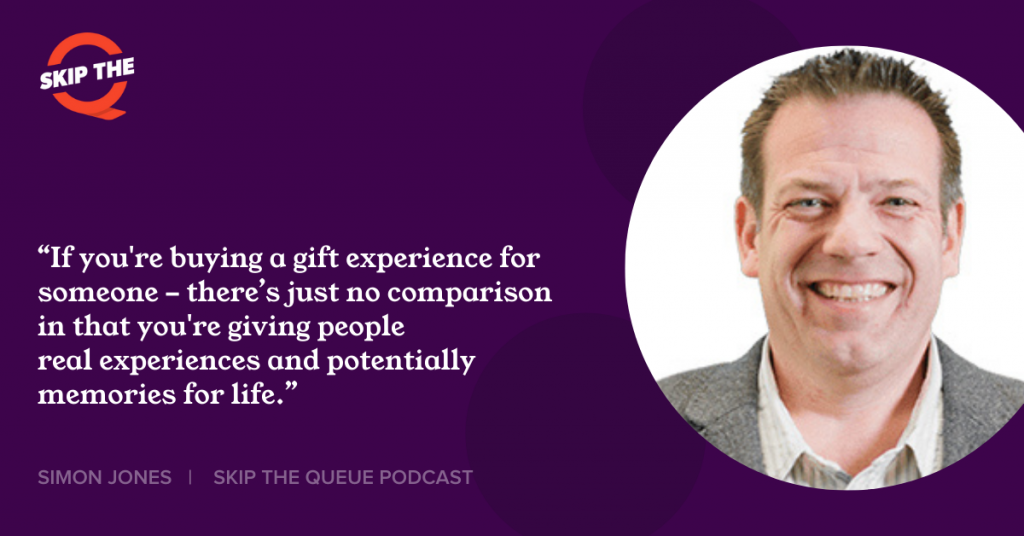
What will you learn from this podcast?
- Experience gifting
- Focusing on niche products
- Multiple strategies to secure revenue for Christmas
Key takeaways from Simon on the podcast:
On digital:
This period shift towards digital has just absolutely built momentum. We are now in a stage where it becomes absolutely the most important thing that you do.
“What digital does is it gives you that complete immediacy to be able to look at things, what’s working, what’s not working, change your tactic straight away. It’s completely agile and it’s totally transparent.”
On digital marketing strategies for Christmas:
“People want to treat others to nice things that they can do. The experience gifting market has grown over the last few years anyway. This is going to really intensify that. If people can’t see you or they’re not allowed to travel to have a big family all together at Christmas, sending the best possible thing you can do as an experience when people can go back out. From an attractions point of view, that’s brilliant because you get the revenue now.”
“I think the whole concept of experience gifting is just absolutely an opportunity that visitor attractions should not miss out on.”
“If you’re buying a gift experience for someone – there’s just no comparison in that you’re giving people real experiences and potentially memories for life.”
“And even better, rather than selling just a one-off ticket if you’ve sold them a membership as a gift, if someone’s giving a membership, you’re going to get that visit time and time again.”
Listen to the podcast here
E25 The evolving relationship of leisure and retail, with Yael Coifman
Yael Coifman, Co-Founder and Senior Partner of Leisure Development Partners.
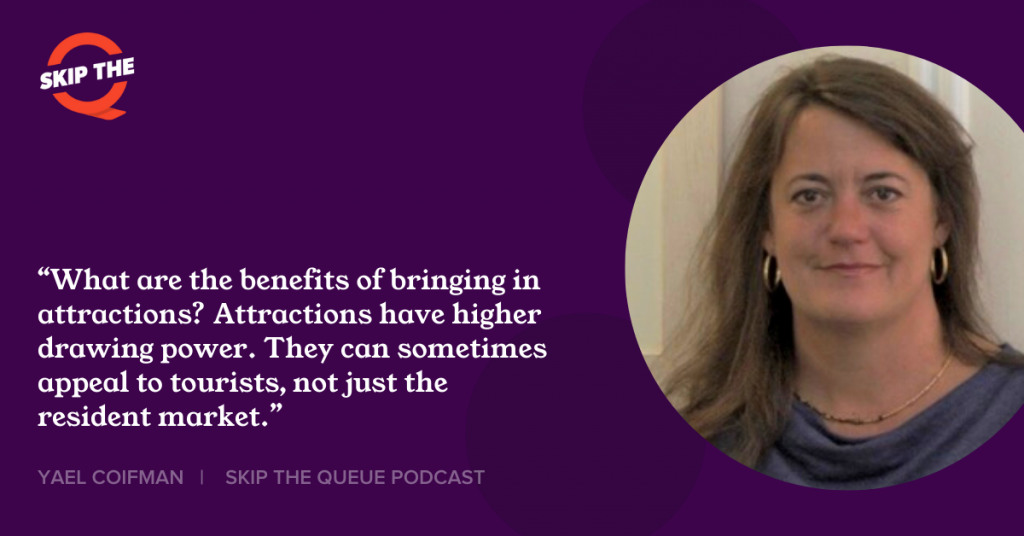
What will you learn from this podcast?
- The impact of COVID on the leisure and attractions sector
- The fusion of leisure and retail space that will be accelerated by the pandemic
- Learning Spanish
Key takeaways from Yael on the podcast:
“Having a lot more people that weren’t used to shopping online, that became used to shopping online. It was exponential growth. A lot of people that were not really used to it, we’re finally starting to do it and we’re realising how easy it was.”
“The incredibly high uptake of streaming as entertainment in-home. Disney+ launched and it reached its five-year target for subscriptions within six months.”
“What are the benefits of bringing in attractions? Attractions have higher drawing power. They can sometimes appeal to tourists, not just the resident market.”
“We’ve been doing work with retail mall owners and developers, as they’re starting to realise that they do need to do something more, that the anchor stores and stuff like that are not enough to get people in.”
“The importance of getting forms of leisure attractions into retail settings, or any sort of commercial mixed-use developments, is much, much higher than it was six months ago, or a year ago.”
Listen to the podcast here
E26 How a digital audience engagement plan gained a global audience from over 30 different countries. With Alex Robertson, Head of Heritage and Education at Chivas Brothers.
Alex Robertson, Head of Heritage and Education and International Graduate Programme and Archives at Chivas Brothers.
Alex leads global advocacy for the Scotch whisky portfolio and a team of 60 international and graduate ambassadors.
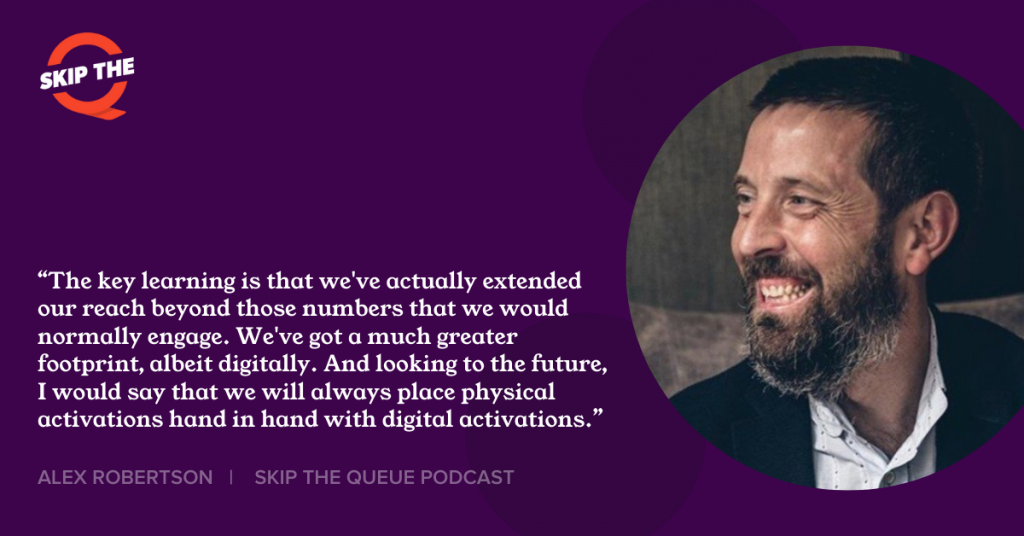
What will you learn from this podcast?
- The superb program of digital audience engagement that Chivas Brothers developed during lockdown
- How that’s gained them a global audience with viewers from over 30 different countries every episode
- How they build an emotional connection with their global audience digitally
- The key learnings that we can take from Chivas during the pandemic
- How Chivas were able to adapt the centres during the COVID pandemic
- Alex Robertson’s bucket list on climbing Mount Everest despite having a fear of heights
Alex’ shared key learnings from Chivas that we can take during the pandemic:
“The key learning is that we’ve extended our reach beyond those numbers that we would normally engage. We’ve got a much greater footprint, albeit digitally. And looking to the future, I would say that we will always place physical activations hand in hand with digital activations.”
“Suddenly we realised there was an opportunity to reach people through digital advocacy. And very quickly, I turned around a digital plan which would centre on Scotch whisky education in the Scotch Whisky Academy. This would address a thirst for knowledge, but within our business, because that was important. We also want employees to be engaged during this and then engage a global audience.”
“Scotch Watch had a couple objectives. The first was actually to meet the makers, the people behind our Scotch whiskies, in a very informal setting. And second, I wanted to create something that was much more informal in nature, that took us away from the traditional pillars of heritage, craftsmanship, and flavour, and actually brought through the personalities of those involved.”
Listen to the podcast here
E27 What your visitors really think about pre-booking. With Jon Young, Director – BVA BDRC
Jon Young, Director at BVA BDRC, an award-winning international consumer insight consultancy.
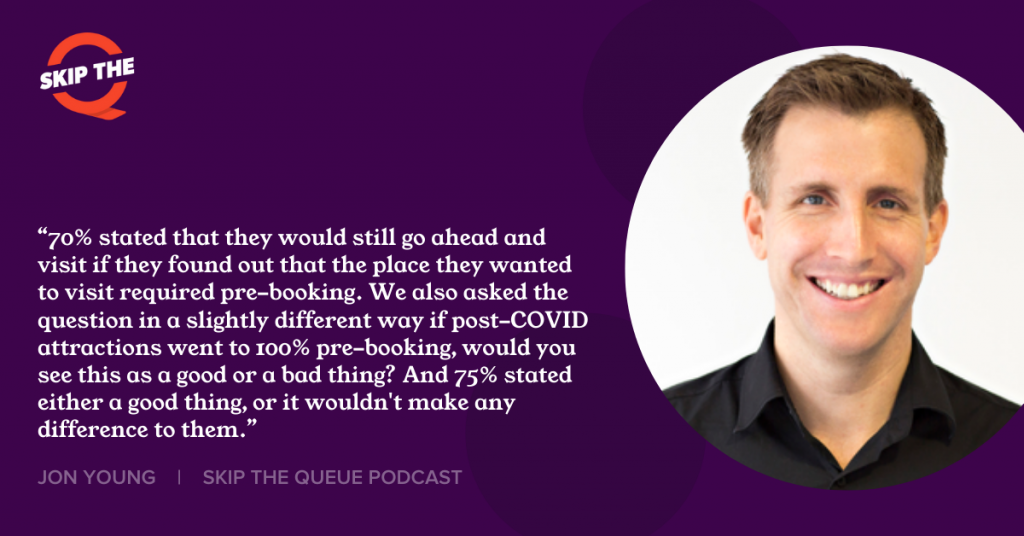
What will you learn from this podcast?
- Their exciting new research around pre-booking
- What the drawbacks are to pre-booking in the eyes of the visitor
- How their consumer sentiment tracker has helped the visitor attraction industry
John shared what the visitors see the benefits of pre-booking to the visitors:
On the benefits of pre-booking to the visitors:
Plan the time with more certainty.
Can plan in advance.
There’s less queuing.
Places just tend to be less busy.
Can research ahead of the visit.
Can have this conversation with the visitor in advance of the visit.
Raise awareness of parts of the attraction that you wouldn’t necessarily see.
Fewer debates about what to do on the day.
On the drawbacks in the eyes of the visitor:
“So what are the drawbacks in the eyes of the visitor? Three in 10 felt they’d probably think twice and not visit and one in four saying it’s a bad thing post-COVID. And the number one reason that people don’t like to book ahead was that they just don’t like to commit to things too early. They prefer to be spontaneous.”
“Another quite interesting quote, a couple of quotes around the spontaneity point. Someone said, “When it’s about entertainment, it’s just stupid to plan your mood.”
Listen to the podcast here
E28 Making Holkham the UK’s most pioneering and sustainable rural estate. With Lucy Downing and Sue Penlington
Lucy Downing, Head of Marketing, and Sue Penlington, Sustainability Manager at Holkham Estates.
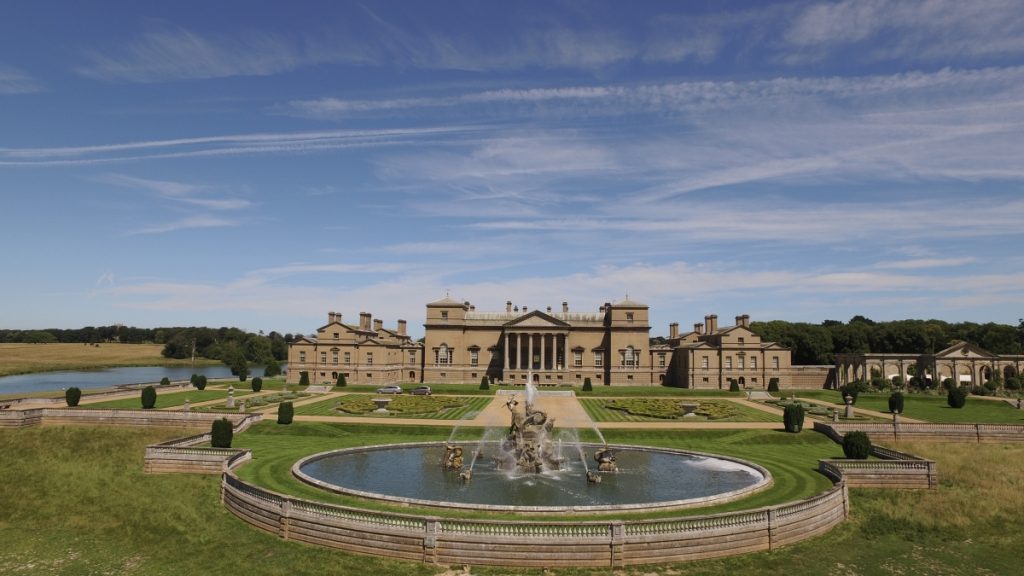
What will you learn from this podcast?
- The wonder of Holkham
- Their exciting sustainability plans
- How they translate to the visitor experience
- How to measure the effectiveness of a sustainability plan
Lucy and Sue’s advice for attractions that are starting to look at sustainability
Lucy Downing:
You need to know where you are because then you can realistically set your goals. A lot of the sustainability gains that you can make are financial ones, too. It has to be sustainable in all ways, socially, financially, and environmentally.
Be authentic and realistic. Think about where you can make the biggest changes environmentally for sustainability and focus on those.
Sue Penlington:
“I’m a bit of a doer, not a talker, so don’t get bogged down. From my point of view, small differences can make a big impact. And keep chipping away, because solutions are out there. There are loads of people doing really cool things.”
Get stuck in and collaborate with other like-minded people. If we can learn from other people, then let’s do that.
“What we’re working on is consistent messaging across all the businesses. So if you’re staying at Pinewoods Holiday Park, the recycling bins look the same as if you come up to the Courtyard Cafe. So just making things easy, making things clear, and then using different media.”
We have a vision for Holkham, which is to be the UK’s most pioneering and sustainable rural estate.
Listen to the podcast here
E29 Why your attraction needs a podcast. With Laura Crossley and Jon Sutton from the National Football Museum.
Laura Crossley – Head of Content and Jon Sutton – Exhibitions Manager at the National Football Museum.
Laura is Head of Content at the National Football Museum in Manchester, UK, where she is responsible for overseeing the collections, exhibitions and communities teams. Prior to working at NFM, she held leadership roles at Oxford University Museums and the National Trust.
Laura has 8 years’ experience as an independent museums consultant, a role in which she worked with museums of all types and sizes to improve resilience through transforming organisational practice, better understanding audiences, improving evaluation, and developing innovative programming. Laura holds a PhD in Museum Studies from the University of Leicester, UK, for research into resilient community engagement practice in museums.
Jon is Exhibitions Manager at the National Football Museum and has worked in the sector for 15 years. He’s worked on a number of exhibitions including Curator of the show ‘Strip: How Football got Shirty’. Born in Blackpool, his seaside upbringing has had an impact on his exhibition ethos of bright colours, cheeky humour where appropriate, experimentation and “what’s the worst that could happen?!”.
Prior to working at NFM, he served candyfloss to the punters at Blackpool Pleasure Beach and worked in the curatorial department at the Manchester United Museum. With a remit to lead the National Football Museum’s move into digital, Jon has co-presented the Museum’s successful podcast and developed a popular online version of the ‘Strip!’ exhibition.
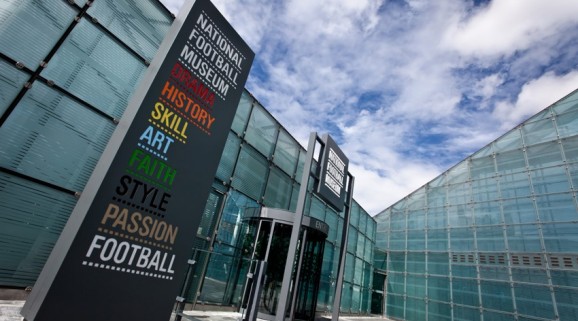
What will you learn from this podcast?
- Why it’s helpful for museums to have a podcast
- What you need to think about strategically if you’re going to create one
- Their new podcast, Strip!
- All of the lessons learned from creating their own podcast
Key Takeaways from Laura and John on the podcast:
Laura Crossley:
Keeping engagement with audiences.
“Definitely have it in the strategic plan. Have a reason for doing it. Know who your audience is. Test if it’s the right thing to do, and it’s fine if you have all of those things and then you try it and it doesn’t work because then you can evaluate why it doesn’t work, but you need to know why you’re doing it”
“Really plan it into strategic planning because of the time it takes, the capacity, the resources. It can feel like it’s free because you might not have to buy loads of equipment but it’s not free because it takes people away from doing stuff in the galleries and the museum.”
Jon Sutton:
“In co-curating the exhibition, we had so many assets. I’d spoken to a lot of the kit manufacturers, a lot of the kit experts. We’d had a panel discussion, been out to some clubs. So we’re sitting on all these assets and we just thought, “If we theme it right, we’ve got a podcast here.”
“There was a bit of me that thought, “Well, what’s the worst that can happen with this thing and if we are terrible, at least we’ve got the guest to pull us out.” The first one we did wasn’t the best but then the next one we did was really good and then what we did was we went back to the first one and re-recorded it.”
Have a reason for doing it. Know who your audience is. Test if it’s the right thing to do, and it’s fine if you have all of those things and then you try it and it doesn’t work because then you can evaluate why it doesn’t work, but you need to know why you’re doing it.
Listen to the podcast here
E30 The Making of Harry Potter. With Geoff Spooner
Geoff Spooner, the Senior Vice President and General Manager of the Warner Bros. Studio Tour – The Making of Harry Potter.
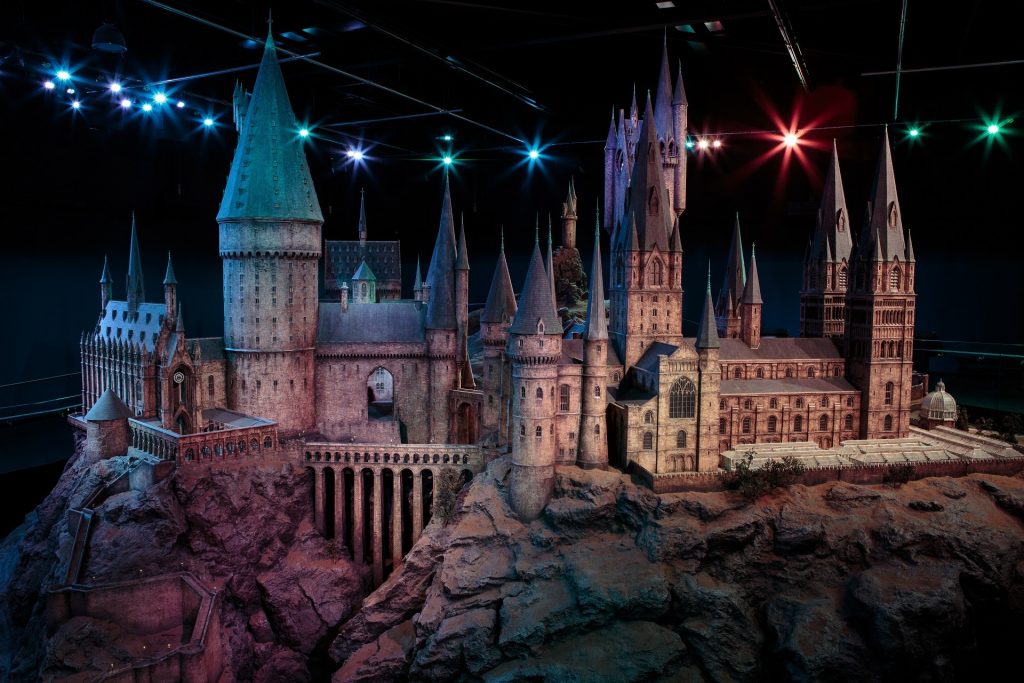
What will you learn from this podcast?
- The tour’s phenomenal success
- The motivation for launching with pre-booking only
- The challenges of having 25,000 five-star TripAdvisor reviews
- How they keep the magic alive for repeat visitors
Key takeaways from Geoff on the podcast:
On pre-booking:
“Pre-booking: I think at the time, there were many people who were concerned that maybe that could be a bit of an Achilles heel for the success of an attraction, but it turned out to be probably one of our best positives as a visitor attraction.”
On the benefits of pre-booking to attractions:
“It was sort of something that was thrust upon us to prevent traffic congestion in the local area.”
To know who’s coming, and how many people are gonna turn up. You’ve got the best chance of preserving a fantastic visitor experience.
You can design your attraction to a maximum. It just makes sure that the attraction doesn’t get overwhelmed. You’ve got an opportunity to manage yields well.
When you have limited capacity and you have to pre-book, you can create demand in the quieter periods. Suddenly people want to come to you on what would traditionally be a quieter day, which is helpful, and that’s a great balance.
“I think if you could combine pre-booking with timed entry, you can create a fantastic experience because it’s much more sustainable to deliver, and you can deliver it probably more efficiently than if everyone just rocks up on the day.”
Listen to the podcast here
E31 Chatbots and voice strategies! How attractions can obtain maximum value from both. With Roy Murphy
Roy Murphy from Synthetic, the chatbot and voice agency.
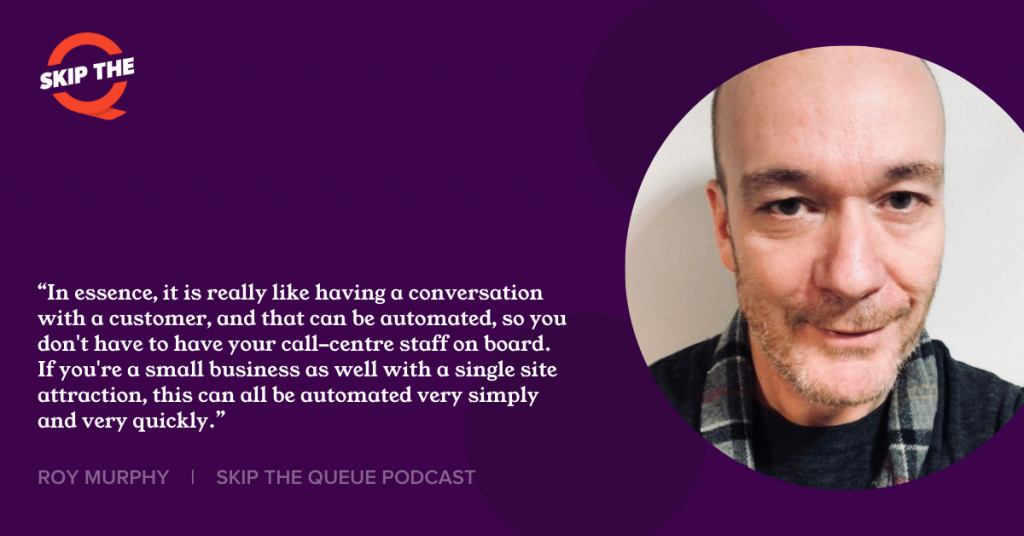
What will you learn from this podcast?
- How attractions can derive maximum value from chatbots
- The opportunity for exciting voice strategies for attractions
- How to improve the guest’s user journey and guest experience online using chatbots
- How chatbots are useful to engage with different demographics
Key takeaways from Roy on the podcast:
How can attractions derive a maximum value from using chatbots:
“First thing you need to do, understand what it is you’re trying to do in terms of the business KPIs, and then the second thing, is describing it – is it a pre-post or after-sales type of scenario, or is it an engagement tool?”
“In essence, it is like having a conversation with a customer, and that can be automated, so you don’t have to have your call-centre staff on board. If you’re a small business as well with a single site attraction, this can all be automated very simply and very quickly.”
“You don’t have to spend huge amounts of time developing new characters or new kinds of personas for your bot, if you’ve got a friendly open museum visitor attraction park, whatever, just use that. Answer the basic questions, and use those questions to inform what you do next.”
“Because the prevalence of chat and voice and all these technologies that are happening and your customers are using them, it’s not a big jump for them, so really it’s something you should be doing, you should be talking to your customers on the channels they’re already using.”
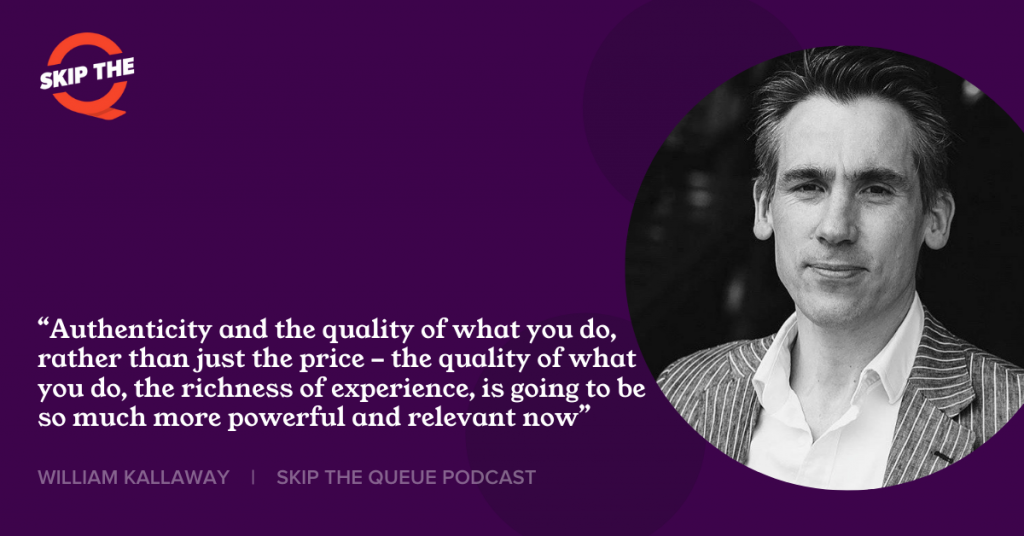

Related articles
Podcast
Skip the Queue Season 2 Episodes 32-43 - What you’ll learn
Podcast
Skip the Queue Season 2 Episodes 10-20 - What you’ll learn
Podcast
Skip the Queue Season 1 - What you’ll learn